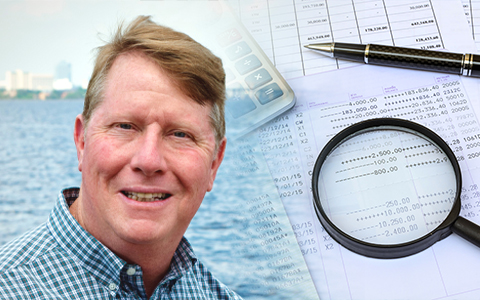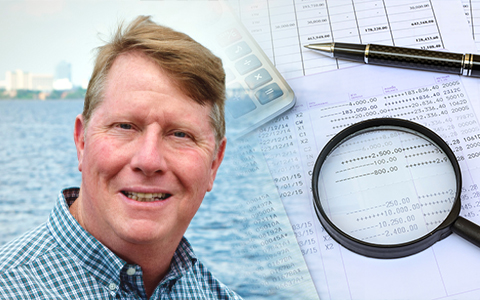Oct 07 Accountancy Alumni
From radio to finance: How one iMSA learner became a forensic accountant

Stephen Rowland’s career has taken some wild turns – but when he reflects on it now, the path he took makes perfect sense.
Throughout the 1980s and 1990s, his family was in the radio business. He went to college and earned his MBA anticipating that it would one day be his business, too. And for a while, it was.
“I did everything other than engineering,” Rowland said. “I ran radio stations. I sold ads. I wrote commercials. I produced them. I voiced them. I announced on air.”
The job required him to obtain information quickly about varying industries. If he was selling ads to a clothing retailer, for instance, he needed to care about what was getting people through the door to buy their clothes. He picked up a lot of useful information about restaurant, construction, service, and merchandising businesses.
He had no idea that 20 years later, he would be applying those same investigative skills to his career in forensic accounting and business valuations.
Branching out
After his family sold their business in 1998, Rowland set out to forge a new path for himself. Following his passion for numbers, he moved to Chicago to work as an economic analyst, writing economic loss reports for personal injury and death cases.

“I was still just kind of piecing things together,” Rowland said. Though he enjoyed the work, it did not register with him at the time that he had found a career in which he could thrive.
For the next several years, he tried on new hats and took courses to help him pivot into new careers – computer programming and real estate brokerage among them. But it wasn’t until 2015 that his career in the accounting profession began in earnest.
A family friend who worked as a family law attorney needed help sorting through some financial figures for a case she was working – one that involved a “convoluted financial mess.” She called up Rowland, who she knew had a knack for parsing numbers and thinking mathematically.
Rowland gave it his best shot. Sifting through the documentation, he pulled pertinent financial information into a more digestible format: “I was able to get it all into a spreadsheet and give her something that she could present in court.” Rowland said she recognized how valuable his assistance had been. She told him that the local legal community needed a forensic accountant.
“Great,” Rowland responded. “What’s a forensic accountant?”
As he soon learned, forensic accountants search for evidence of fraud or other fund misappropriation in financial documents, often helping insurance companies, financial institutions, or representatives in the justice system investigate fraud.
Rowland was intrigued by the idea – he joined his friend’s law firm, helping her with financial analyses while he became a certified fraud examiner (CFE) and earned his accreditation as a Master Analyst in Financial Forensics (MAFF). A little over a year later, he had begun working independently with clients on probate cases and launched his own financial forensics firm.
Among other things, he helped his clients discover hidden assets and hidden earnings, and he consulted on cases concerning inheritance issues. He found the work extremely rewarding, especially when his analyses helped families or victims of fraud.
Leveling up
The game changed for Rowland in 2018, when a client’s attorney stumped him with a complicated tax question. That moment, he said, was a revelation for him. He realized the gap between what he wanted to know and what he already did and started thinking seriously about going back to school to level up his accounting expertise.
After weighing his options, he decided the best path forward was for him to earn a graduate accounting degree and his CPA license. He chose the online Master of Science in Accountancy (iMSA) program because it fit his lifestyle and budget, and because it’s built for people who want advanced accountancy knowledge. He joined the program and loved it.
Around the same time, he was accepted into the iMSA program, he signed on with a certified public accounting (CPA) firm, working full time.
“Because the iMSA was so flexible, and because my employer was flexible with me, I was able to simultaneously earn my hours [for CPA exam candidacy] while completing my graduate degree,” Rowland said. “That’s probably one of the biggest selling points of the iMSA.”
Today, Rowland works as a valuation, forensics, and litigation (VFL) manager at LitmanGerson Associates (LGA), LLP, a CPA firm in Massachusetts. He has gone on to earn more credentials in financial analysis. Though he still works to uncover monetary misdeeds, he has also expanded his skill set to valuing businesses.
Rowland said that if there is a takeaway from his story, it’s that the traditional path of going to college and starting a career isn’t the only option available.
“I started grad school at 52. I finished grad school at 54. I got my CPA license at 55, and I am a manager in a CPA firm at 58,” he said.
While the thought of rebuilding his career later in life used to bother him, he now takes pride in having taken an alternate path to reaching his goals.
“We're in a changing world. There are a lot of people that went into a field following their initial collegiate experience, but now their skill is either becoming outdated or they are seeking new professional challenges. The iMSA was ideal for me as I reinvented my professional life.”
It’s never too late to start pursuing your passions – and there’s always something new for you to learn. Check out our online graduate programs, built for learners at any career stage.

